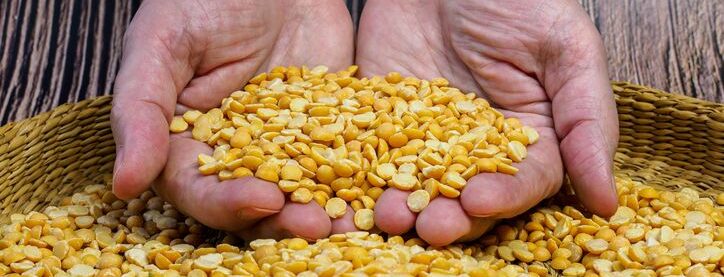In 2021, Merit Functional Foods unveiled a state-of-the-art facility for producing high-purity pea and canola proteins in Winnipeg, Canada. By March 2023, receivers had been called in. So what went wrong? And why, over a year later, is there still no buyer?
In a LinkedIn post in Feb 2023, co-CEO Ryan Bracken blamed factors from higher raw materials costs and rising interest rates to the “risk appetite from lenders and/or investors drying up” and “commissioning of a novel product taking 12 times longer than promised.”
In a recent letter to the Canada Border Services Agency (CBSA) supporting its investigation into alleged dumping of Chinese pea protein in Canada, however, Merit co-CEO Barry Tomiski laid the blame squarely at a flood of cheap imports from China.
Merit co-CEO: ‘Low Chinese pricing was the main reason our operation became non-viable’
According to Tomiski, Chinese companies have been dumping high protein content (HPC) pea protein on the Canadian market, subsidized by the Chinese government, making it impossible for domestic producers to compete.
“We were constantly coming up against low-priced competition from China,” said Tomiski. “The market had become hooked on these low-priced imports, making it essentially impossible for us to break in. This is notwithstanding that we were offering a superior product… Simply put, low Chinese pricing was the main reason our operation became non-viable and drove us out of the market.”
He added: “To this day, Merit’s plant remains for sale with no buyer as of yet. In the current market, which is absolutely dominated by low-priced Chinese imports, it is difficult to see how a potential buyer could rationalize investing in the plant. On the other hand, if price levels in the North American, including Canadian market improved and remained stable, I believe that the plant could still be sold and re-opened as a going concern.”
“In the current market, which is absolutely dominated by low-priced Chinese imports, it is difficult to see how a potential buyer could rationalize investing in the plant.” Barry Tomiski, former co-CEO, Merit Functional Foods

What is meant by dumping and subsidizing?
According to the Canadian International Trade Tribunal, “anti-dumping and countervailing duties come into play in two types of unfair trading practices: dumping and subsidizing.
- “Dumping occurs when foreign producers sell their goods in the Canadian market for less than the price in their home markets.
- “Subsidizing refers to the provision of financial or other support by foreign governments to their producers to reduce their costs of production.”
According to Roquette and NutriPea: “Evidence… supports the conclusion that HPC pea protein prices in China are not substantially the same as they would be if they were determined in a competitive market.”
A spokesman for the Tribunal told AgFunderNews. “The Canada Border Services Agency (CBSA) determines and collects duties and determines the existence of dumping and subsidizing. The Tribunal’s role is limited to inquiring into and deciding whether dumped and/or subsidized imports have caused, or are threatening to cause, injury to a domestic industry.
“With respect to pea protein, the Tribunal initiated a preliminary injury inquiry on April 23, 2024, as a result of the initiation of dumping and subsidizing investigations by the CBSA.
“If the CBSA makes a final determination that there has been dumping or subsidizing, and if the Tribunal finds that this has caused, or threatens to cause, injury to a domestic industry, only then will the CBSA determine what, if any, duties should be imposed on the imports.”
Roquette, NutriPea in a ‘losing battle against unfairly traded subject imports’
According to a March 2024 complaint filed with the CBSA from pea protein giants Roquette and NutriPea, the loss of 110 jobs at Merit “is likely the harbinger of future losses” if the domestic industry continues to wage a “losing battle against unfairly traded subject imports.”
Average unit import values (AUVs) of Chinese HPC pea protein have consistently undercut the domestic industry’s net sales prices, causing “material injury,” claim Roquette and NutriPea. “This increasing trend of price suppression and depression is unsustainable for Canadian domestic producers.
“Since 2020, the increased presence of Chinese HPC pea protein has corresponded to declines in the domestic industry’s sales, market share, production capacity, profitability, investments and return on investment, and employment. It is likely that domestic industry’s performance will only worsen, risking the viability of the domestic industry participating in the domestic market altogether.”
Meanwhile, successful efforts by the US government to tackle alleged dumping of Chinese pea protein on the US market are making life even tougher for Canadian producers in the short term, with Chinese product that was going to the US now being diverted to Canada as US purchasers seek to avoid duty liability, noted Roquette and NutriPea.
“As preliminary anti-dumping and countervailing duties were levied in February 2024 and December 2023, respectively, diversion has already begun. The impact will only grow if final duties [on imports of HPC Chinese pea protein to the US] are confirmed in August 2024.”
According to Roquette and NutriPea, the estimated market share of HPC pea protein imports from China in Canada has “exploded” in recent years: “Both the overall magnitude and rate of increase in this ratio over the period of investigation are virtually unprecedented in Canadian trade remedy cases.”
“Evidence… supports the conclusion that HPC pea protein prices in China are not substantially the same as they would be if they were determined in a competitive market.” Complaint to CBSA from Roquette and NutriPea
The US investigation
The Canadian investigation follows similar efforts by the US government to address alleged dumping of Chinese HPC pea protein on the US market prompted by a complaint from PURIS, a leading US pea processor. PURIS claims it was forced to lay off workers at its plant in Turtle Lake Wisconsin as a “direct result of dumped and subsidized imports from China” and scale back production at its plant in Dawson, Minnesota.
The case is ongoing, but PURIS scored an initial victory in February this year. In a preliminary determination, the DOC said it had found that Chinese pea protein is being sold in the US at “less than fair value” and said it would implement preliminary duties on dumped imports of high protein content (HPC) pea protein of between 112% and 270%.
Pea protein production capacity in North America
While pea protein still lags behind soy in the plant-based protein stakes, North American production capacity has been expanding rapidly in recent years, with PURIS opening a plant in Dawson, Minnesota; Ingredion opening a facility in Nebraska; ADM opening a plant in North Dakota; Roquette opening a plant in Portage la Prairie, Manitoba, Canada, and Louis Dreyfus Company announcing a new plant in Saskatchewan expected to come online in late 2025.
At the same time, China’s pea protein processing capacity has been steadily rising. As there is low domestic demand for the protein coming out of its facilities (most of the domestic demand is for starch, which is used in noodles), it is being sent to the US at bargain basement prices, claim North American producers.
“There is compelling evidence that Chinese imports have undersold the domestic industry prices throughout the period of investigation,” claimed PURIS in its 2023 petition to the US international trade commission. “The future of the domestic industry is in grave peril.”
Timeline for Canadian investigation (2024)
March 1: The Canadian Border Services Agency (CBSA) receives complaint from NutriPea and Roquette Canada.
April 22: The CBSA starts an investigation.
April 23: The Canadian International Trade Tribunal initiates preliminary injury inquiry to determine if NutriPea and Roquette have suffered injury as a result of the alleged dumping and subsidizing.
May 7: The CBSA publishes a statement of reasons outlining the key issues in the investigation.
June 20: The Tribunal will determine if there’s a reasonable indication that the alleged dumping and subsidizing have caused injury or retardation or threaten to do so.
July 19: The Tribunal will make preliminary determinations. If these indicate there has been dumping or subsidizing, the CBSA will continue its investigations and, concurrently, the Tribunal will initiate a final injury inquiry.
October 21: Final determination or termination of the CBSA’s dumping and/or subsidy investigations.
Read more HERE.





